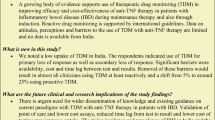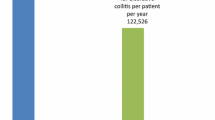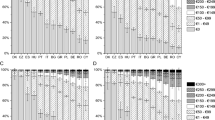Abstract
Background
Therapeutic drug monitoring (TDM) is increasingly performed to optimize biologic therapy in inflammatory bowel disease (IBD). However, patients and physicians may be reluctant to perform TDM due to concerns related to potential out-of-pocket costs.
Aims
The aim of this study was to evaluate patient understanding and attitudes toward TDM in different clinical scenarios with and without potential out-of-pocket costs.
Methods
Adult IBD patients at a tertiary gastroenterology clinic were anonymously surveyed from March to September 2016 to assess their understanding of and willingness to undergo TDM in a variety of clinical scenarios, both with and without a potential out-of-pocket cost. Responses were analyzed for associations with changes in attitudes if out-of-pocket costs were involved.
Results
Of 118 completed surveys, 68.2% of patients were aware of or had previously undergone TDM. Patient willingness to undergo TDM was high both with and without potential out-of-pocket costs (70 and 98%, respectively); however, patients were significantly less willing with out-of-pocket cost (p < 0.01). Higher disease-related quality of life scores, as measured by the short inflammatory bowel disease questionnaire (SIBDQ), was significantly associated with an increased willingness to assume a potential out-of-pocket cost (p = 0.007).
Conclusions
Overall, patients understand and are willing to undergo TDM in certain potentially beneficial clinical scenarios, however, are significantly less willing if paying out-of-pocket. A higher SIBDQ score was associated with an increase in willingness to undergo TDM when out-of-pocket cost was involved. Physicians should discuss TDM with their patients in order to make an informed and personalized treatment decision.


Similar content being viewed by others
References
Baert F, Noman M, Vermeire S, et al. Influence of immunogenicity on the long-term efficacy of infliximab in Crohn’s disease. N Engl J Med. 2003;348:601–608.
Sandborn WJ. Tailoring treatment to the individual patient: drug monitoring. Dig Dis. 2014;32:88–91.
Vaughn BP, Sandborn WJ, Cheifetz AS. Biologic concentration testing in inflammatory bowel disease. Inflamm Bowel Dis. 2015;21:1435–1442.
Adedokun OJ, Sandborn WJ, Feagan BG, et al. Association between serum concentration of infliximab and efficacy in adult patients with ulcerative colitis. Gastroenterology. 2014;147:1296–1307. (e1295).
Colombel JF, Sandborn WJ, Allez M, et al. Association between plasma concentrations of certolizumab pegol and endoscopic outcomes of patients with Crohn’s disease. Clin Gastroenterol Hepatol. 2014;12:423–431. (e421).
Osterman MT, Roblin X, Glover SC, et al. 512 Association of vedolizumab drug concentrations at or before week 6 with remission at week 14 in moderately to severely active ulcerative colitis patients from GEMINI 1. Gastroenterology. 2016;150:S105.
Roblin X, Marotte H, Rinaudo M, et al. Association between pharmacokinetics of adalimumab and mucosal healing in patients with inflammatory bowel diseases. Clin Gastroenterol Hepatol. 2014;12:80–84. (e82).
Seow CH, Newman A, Irwin SP, Steinhart AH, Silverberg MS, Greenberg GR. Trough serum infliximab: a predictive factor of clinical outcome for infliximab treatment in acute ulcerative colitis. Gut.. 2010;59:49–54.
Ungar B, Levy I, Yavne Y, et al. Optimizing anti-TNF-alpha therapy: serum levels of infliximab and adalimumab are associated with mucosal healing in patients with inflammatory bowel diseases. Clin Gastroenterol Hepatol. 2016;14:550–557. (e552).
Yarur AJ, Jain A, Hauenstein SI, et al. Higher adalimumab levels are associated with histologic and endoscopic remission in patients with Crohn’s disease and ulcerative colitis. Inflamm Bowel Dis. 2016;22:409–415.
Papamichael K, Baert F, Tops S, et al. Post-induction adalimumab concentration is associated with short-term mucosal healing in patients with ulcerative colitis. J Crohn’s Colitis. 2017;11:53–59.
Papamichael K, Van Stappen T, Vande Casteele N, et al. Infliximab concentration thresholds during induction therapy are associated with short-term mucosal healing in patients with ulcerative colitis. Clin Gastroenterol Hepatol. 2016;14:543–549.
Bortlik M, Duricova D, Malickova K, et al. Infliximab trough levels may predict sustained response to infliximab in patients with Crohn’s disease. J Crohn’s Colitis. 2013;7:736–743.
Cornillie F, Hanauer SB, Diamond RH, et al. Postinduction serum infliximab trough level and decrease of C-reactive protein level are associated with durable sustained response to infliximab: a retrospective analysis of the ACCENT I trial. Gut. 2014;63:1721–1727.
Zittan E, Kabakchiev B, Milgrom R, et al. Higher adalimumab drug levels are associated with mucosal healing in patients with Crohn’s disease. J Crohn’s Colitis. 2016;10:510–515.
Afif W, Loftus EV Jr, Faubion WA, et al. Clinical utility of measuring infliximab and human anti-chimeric antibody concentrations in patients with inflammatory bowel disease. Am J Gastroenterol. 2010;105:1133–1139.
Martelli L, Olivera P, Roblin X, Attar A, Peyrin-Biroulet L. Cost-effectiveness of drug monitoring of anti-TNF therapy in inflammatory bowel disease and rheumatoid arthritis: a systematic review. J Gastroenterol. 2017;52:19–25.
Velayos FS, Kahn JG, Sandborn WJ, Feagan BG. A test-based strategy is more cost effective than empiric dose escalation for patients with Crohn’s disease who lose responsiveness to infliximab. Clin Gastroenterol Hepatol. 2013;11:654–666.
Papamichael K, Chachu KA, Vajravelu RK, et al. Improved long-term outcomes of patients with inflammatory bowel disease receiving proactive compared with reactive monitoring of serum concentrations of infliximab. Clin Gastroenterol Hepatol. 2017;15:1580–1588.
Vande Casteele N, Ferrante M, Van Assche G, et al. Trough concentrations of infliximab guide dosing for patients with inflammatory bowel disease. Gastroenterology. 2015;148:1320–1329. (e1323).
Vaughn BP, Martinez-Vazquez M, Patwardhan VR, Moss AC, Sandborn WJ, Cheifetz AS. Proactive therapeutic concentration monitoring of infliximab may improve outcomes for patients with inflammatory bowel disease: results from a pilot observational study. Inflamm Bowel Dis. 2014;20:1996–2003.
Feuerstein JD, Nguyen GC, Kupfer SS, Falck-Ytter Y, Singh S. American Gastroenterological Association Institute guideline on therapeutic drug monitoring in inflammatory bowel disease. Gastroenterology.. 2017;153:827–834.
Steenholdt C, Brynskov J, Thomsen OO, et al. Individualized therapy is a long-term cost-effective method compared to dose intensification in Crohn’s disease patients failing infliximab. Dig Dis Sci. 2015;60:2762–2770. doi:10.1007/s10620-015-3581-4.
Janssen to Provide Free Therapeutic Drug Monitoring for IBD Patients on Remicade, September 2, 2016. http://www.gastro.org/news_items/janssen-to-provide-free-therapeutic-drug-monitoring-for-ibd-patients-on-remicade. Accessed February 7, 2017.
Prometheus Links Program, Prometheus Therapeutics & Diagnostics. https://www.anserifx.com/PDF/Links_Tear_Sheet.pdf. Accessed February 7, 2017.
Irvine EJ, Zhou Q, Thompson AK. The Short Inflammatory Bowel Disease Questionnaire: a quality of life instrument for community physicians managing inflammatory bowel disease. CCRPT Investigators. Canadian Crohn’s Relapse Prevention Trial. Am J Gastroenterol.. 1996;91:1571–1578.
Jowett SL, Seal CJ, Barton JR, Welfare MR. The short inflammatory bowel disease questionnaire is reliable and responsive to clinically important change in ulcerative colitis. Am J Gastroenterol. 2001;96:2921–2928.
Kleinman L, McIntosh E, Ryan M, et al. Willingness to pay for complete symptom relief of gastroesophageal reflux disease. Arch Intern Med. 2002;162:1361–1366.
Schwartz CE, Sprangers MA. Methodological approaches for assessing response shift in longitudinal health-related quality-of-life research. Soc Sci Med. 1999;48:1531–1548.
Johnson FR, Ozdemir S, Mansfield C, et al. Crohn’s disease patients’ risk-benefit preferences: serious adverse event risks versus treatment efficacy. Gastroenterology. 2007;133:769–779.
Nowakowska D, Guertin JR, Liu A, et al. Analysis of willingness to pay for implantable cardioverter-defibrillator therapy. Am J Cardiol. 2011;107:423–427.
Wong YN, Hamilton O, Egleston B, Salador K, Murphy C, Meropol NJ. Understanding how out-of-pocket expenses, treatment value, and patient characteristics influence treatment choices. Oncologist. 2010;15:566–576.
Acknowledgments
Aaron Rendahl, Ph.D. for assistance with data analysis.
Funding
This study was funded in part by the National Center for Advancing Translational Sciences of the National Institute of Health, Award Number UL1TR000114. The content is solely the responsibility of the authors and does not necessarily represent the official views of the National Institutes of Health.
Author information
Authors and Affiliations
Corresponding author
Ethics declarations
Conflict of interest
BPV has served as a speaker, a consultant and an advisory board member for Janssen and Abbvie, and has received research funding from Roche and Takeda. The remaining authors declare that they have no conflict of interest.
Ethical approval
All procedures performed in studies involving human participants were in accordance with the ethical standards of the institutional and/or national research committee and with the 1964 Declaration of Helsinki and its later amendments or comparable ethical standards.
Informed consent
Informed consent was obtained from all individual participants included in the study.
Electronic supplementary material
Below is the link to the electronic supplementary material.
Supplementary Figure 1
ROC curve for SIBDQ using outcome: Willingness to pay did not decrease >1 on Likert scale with introduction of cost. An SIBDQ cutoff of 44 was a predictor of willingness to undergo TDM with an out-of-pocket cost. (TIFF 26670 kb)
Rights and permissions
About this article
Cite this article
Campbell, J.P., Burton, E., Wymer, S. et al. Out-of-Pocket Cost Is a Barrier to Therapeutic Drug Monitoring in Inflammatory Bowel Disease. Dig Dis Sci 62, 3336–3343 (2017). https://doi.org/10.1007/s10620-017-4808-3
Received:
Accepted:
Published:
Issue Date:
DOI: https://doi.org/10.1007/s10620-017-4808-3




